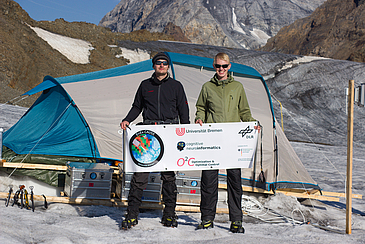The EnEx partners – the Rheinisch-Westfälische Technische Hochschule Aachen (RWTH Aachen), the FH Aachen University of Applied Sciences, researchers from the Faculty of Mathematics/Computer Science at the University of Bremen, the Technische Universität Braunschweig (TU Braunschweig), and the Aachener Gesellschaft für Systementwicklung und Instrumentierung (GSI) GmbH – met again in the Italian Ortler Alps. On the Langenferner, they are testing navigation technologies because the glacier has proven to be particularly suitable for scientific experiments.
Combination of Melting Probes
A combination of several autonomously acting melting probes was tested. The IceMole melting probe developed by the FH Aachen is navigable. It is designed to locate water-filled crevasses under the ice surface, drill them, take liquid samples, and analyze them. Other probes are used to determine the position, similar to satellite navigation systems. The task of the researchers from the University of Bremen was to determine the position and location of all probes in the ice in real time and to navigate the IceMole to its destination. “We were able to successfully demonstrate both during the field test,” says Joachim Clemens, the project manager.
Space Mission Planned for 2040
The University of Bremen is involved with Professor Kerstin Schill’s cognitive neuroinformatics research group and Professor Christof Büskens’ optimization and optimal control research group. The EnEx mission could probably be implemented by 2040. However, the technologies researched are not only relevant for future space missions. The researchers at the University of Bremen will also use them for terrestrial applications, for example in the field of highly automated driving.
Additional Information:
www.cognitive-neuroinformatics.com/de/forschung/projekte/enex-cause
Contact:
Joachim Clemens
Cognitive Neuroinformatics
Faculty of Mathematics/Computer Science
University of Bremen
Tel.: +49 421 218-64218
E-mail: jclemens@informatik.uni-bremen.de

